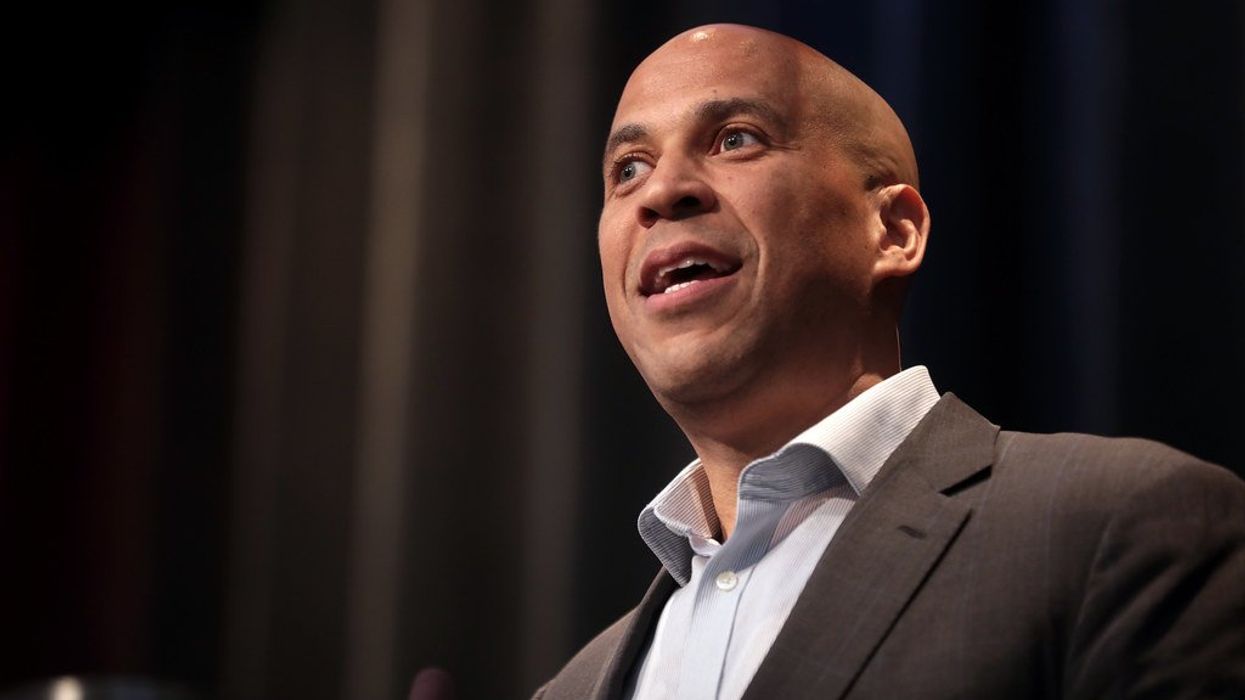Just when prophetic witness felt muted by political expediency, Senator Cory Booker's unprecedented 25-hour marathon speech on the Senate floor is a powerful testament to moral courage and democratic resilience. Beginning at 7 p.m. on Monday (3/31/25) and extending through Tuesday (4/1/25) evening, Booker's historic address surpassed Strom Thurmond's infamous 1957 record, though with a profound difference, reconstituting the meaning of a "moral moment."
The New Jersey senator's sustained oratory wasn't merely a political gesture—it embodied the prophetic tradition that has long animated America's moral progress. Like the Hebrew prophets who stood before kings, speaking truth to power at high personal cost, Booker's political discourse represented a contemporary form of bearing witness. His physical endurance became a metaphor for the sustained resistance required in facing injustice.
Throughout his impassioned address, Cory Booker masterfully interwove the fundamental pillars of democratic values, social justice, and moral accountability into a compelling narrative that resonated far beyond the chamber walls. His unwavering stance against what he perceived as executive overreach wasn't merely political theater or partisan posturing—it represented something far more profound. In his measured yet forceful delivery, Booker embodied what the influential theologian Reinhold Niebuhr explored in his seminal work "Moral Man in an Immoral Society": the critical importance of individual moral action when faced with institutional failure.
Drawing from a deep well of American democratic tradition, Booker positioned himself not as a mere political opponent but as a moral agent. He presented an argument that transcended typical legislative disagreements, instead focusing on how democratic societies maintain their ethical foundations when institutional guardrails falter.
Thus, Booker's address exhibited how political discourse can be elevated beyond partisan boundaries to touch upon universal principles of democratic governance and ethical leadership. Just as Niebuhr posited that moral individuals must sometimes stand against the tide of institutional corruption, Booker's address served as a living example of this principle in action.
Booker also sparked a digital wildfire. Between sips of water and intermittent question breaks, he read through thousands of emails flooding his inbox. People shared their stories: teachers from Newark, nurses from Camden, and a grandmother in Trenton who stayed up all night to livestream the Senate proceedings, her first time following them. The record-breaking speech racked up over 12 million views on TikTok, with clips spreading faster than Senate staffers could track them. Instagram posts about the filibuster jumped to the top of trending feeds, pulling in viewers who'd never paid attention to Senate procedure before. One 30-second clip of Booker quoting James Baldwin hit 800,000 likes in just three hours.
But this wasn't just about going viral. Every hour Booker stood there, more Americans tuned in. They didn't see some dry political theater—they saw a man putting his body on the line for something he believed in, as so many others had done before. And just like those moments, this one spread person by person, screen to screen, until you couldn't look away.
Cory Booker’s voice went hoarse, and his legs got tired. Yet, the tweets kept coming; views kept climbing, and Americans' perception of what was possible shifted. Standing up for 25 hours straight, one senator showed us what democracy looks like when it's wide awake. Despite physical exhaustion, the senator's commitment to speaking truth to power exemplifies the moral leadership our polarized era desperately needs. What makes this moment particularly significant for spiritual leaders and activists is how Booker's actions bridge the gap between the political process and moral imperative. His speech wasn't just about opposition; it articulated an alternative vision of American democracy rooted in dignity, justice, and mutual respect. This is precisely the prophetic imagination that theological education seeks to cultivate.
Likewise, the marathon speech offers a contemporary case study of moral leadership. It demonstrates how traditional democratic processes can be infused with moral purpose, providing a model for how religious leaders might engage with political institutions while maintaining their prophetic edge. Senator Booker's speech offered moral clarity for a time bereft of truth, courage in times of compromise, and conviction in times of convenience. An action embodying full expression of democracy is not defined as a political system but as a moral framework requiring ongoing renewal through acts of principled resistance and ethical witness.
Every American should consider how Booker's example might inform their respective work, participation, and responsibility to our nation's democratic project. The senator's demonstration of sustained moral witness, physical endurance, and principled opposition provides a template for engaging in public discourse with passion and purpose. Moreover, Senator Booker's marathon speech wasn't just about setting a new record but reestablishing a bar of morally grounded witness in public life. Booker’s righteous obstruction serves as a potent reminder that our democratic institutions remain platforms for prophetic ethical witness, provided we dare to stand and speak.
Rev. Dr. F. Willis Johnson is a spiritual entrepreneur, author, scholar-practioner whose leadership and strategies around social and racial justice issues are nationally recognized and applied.




















Trump & Hegseth gave Mark Kelly a huge 2028 gift